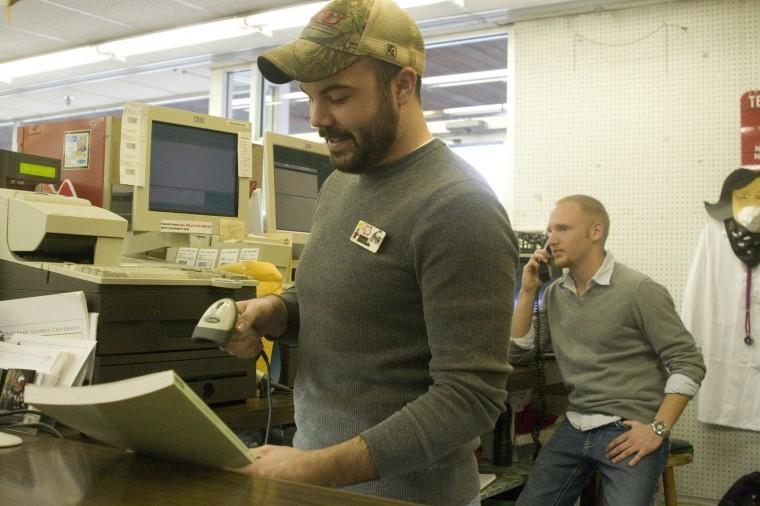Study shows raising minimum wage may help working families
Senior General Studies major Mike Cuddy (left) and Senior Political Science major Andrew Forbes (right) work at the Village Commons Bookstore Tuesday afternoon. VCB Workers are paid minimum wage.
February 14, 2012
Raising the minimum wage in Illinois may help those hardest hit by the recession, a Jan. 30 Economic Policy Institute study (EPI) stated. New jobs, economic growth and increasing income for working families would be possible with high minimum wage, the study stated.
Students may benefit from a high minimum wage as well. Lauren Pagan, junior psychology and philosophy major, works two jobs, one of them for minimum wage at the Ogden 6 movie theater in Naperville. She said her jobs help her save for graduate school and pay for gas and groceries. Raising the minimum wage for students would be helpful, she said.
“Any little bit more would help,” she said.
About 43 percent of NIU students employed are paid minimum wage, said Steven Cunningham, vice president of human resources and compliance, in an e-mail.
“NIU students are not permitted to make less than $8.25 an hour,” he said.
Recently, there have been attempts by Illinois lawmakers to increase the state minimum wage incrementally to $10.56 over four years. Minimum wage in Illinois is $8.25, while the federal minimum wage is $7.25. The first reading of the bill was on Feb. 9, 2011. It failed to meet an April 8 deadline for passage. The bill was re-referred to an assignments committee and then re-assigned to an executive committee on Jan. 31 with the potential for more readings.
A boost in minimum wage may do more harm than good, said Carl Campbell III, associate professor of economics.
“It costs more to employ somebody,” Campbell said.
Most economists believe at some level that a high minimum wage will increase the unemployment rate by pricing workers out of the market, he said. Increasing minimum wage may be good for some people if they can get employed, Campbell said.
“They’ll be earning more, but if they’re laid off because they’re no longer profitable to the firms, then they would be hurt by it,” Campbell said.
The EPI study stated increasing minimum wage would not have a negative effect on the labor market. During recession periods in the past, including the 2007-2009 period where Congress raised federal minimum wage from $5.15 to $7.25, the raise did not cause employment declines, the study stated.
The value of minimum wage has declined since the 1980s and the value of minimum wage in Illinois for a full-time, full-year worker has dropped below poverty level for a family of three, according to the study.







